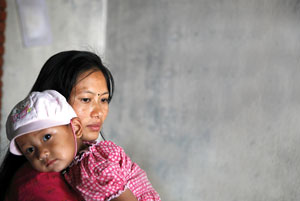ē Shanti Lama from Lalitpur (left) was raped by a recruiter who promised her a good job in Kuwait if she kept quiet. Nine months later, she was sent back by her employers when she gave birth to a baby girl. 
ē Prema Rana of Surkhet was locked up for five years in her employer's house in Lebanon, she returned without being paid. She says she was tricked by a recruiter named Sher Bahadur Lama.
ē Ganga Sunar of Baglung was sent to Saudi Arabia by her recruiter on a forged passport. She committed suicide while there.
ē Binita Thapa of Chitwan returned mentally disturbed from Lebanon. Her husband is in debt trying to get her treatment.
These are only some of the many heart-wrenching stories of thousands of Nepali women who are sexually abused, physically tortured and even murdered by their Nepali recruiters and employers in the Gulf.
Last month, six women were rescued from a building in Kathmandu where an agent had kept them locked up after the husband of one of the victims reported her as missing.
Until 2007, Nepali women were being trafficked in large numbers because going to the Gulf for employment was banned by the government. Purna Chandra Bhattarai, the director general of the Foreign Employment Department, admits that the state lifted the ban and legalised individual contracts for domestic workers after growing pressure from the media and civil society. But sending workers abroad without legal protection and proper verification of employers, exposes the women to exploitation and abuse in Nepal itself.
"Making sure that your citizens are safe and well protected should be a priority for any country, but the Nepali government legalised individual contracts, without putting in necessary safeguards," says Bal Bahadur Tamang, chairman of Nepal Association of Foreign Employment Agencies. The multi-million dollar migrant labour sector, the largest contributor to the country's GDP, however, seems more important to the government than its expendable population.
In June last year, the Kuwait government decided to drop immigration charges against all illegal workers, after which 1,300 Nepali domestic workers contacted the Nepal Embassy there, requesting to be rescued. At least 15 women had children born after they were raped by employers.
The risk for Nepali women working in Gulf countries is so serious that only a handful manage to get out alive and without being abused. Last year, Durga Chunar of Gorkha was beaten to near death by her employer in Kuwait. She was rescued by the police and sent back to Nepal after receiving treatment for a month at the embassy.
"I am lucky to be alive. But I want to tell my Nepali sisters and brothers to not go to that country," Chunar told us, weeping.
Others are not so lucky. Between 2008 and 2010, 18 Nepali women committed suicide in Lebanon of which 12 had gone through recognised recruitment agencies.
Poor, illiterate women are the most vulnerable because they have no idea about the 'Kafala' system practiced in most Gulf countries according to which workers cannot quit or choose their employers. Passports and legal documents are deposited with employers, leaving them at their mercy.
Manju Gurung of Pourakhi, an organisation set up by returned women migrant workers themselves, says the lack of transparency and accountability of the contract system are responsible for the exploitation of domestic workers. "When a woman directly enters into a contract with her foreign employer, it becomes difficult to legally identify or implicate the Nepali recruiters," she explains.
According to a UN report, at least 111 Nepali women are trapped in various jails across the Middle East, 88 have committed suicide, and 31 remain unaccounted for. Out of the 2,820 migrants rescued from these countries, 415 suffer psychological trauma, 86 were raped, and 32 have returned with babies.
Unless the government is serious about enforcing the provisions of the Foreign Employment Act and creates a safety net for migrant workers, these statistics and the lives of countless Nepali women will only get worse.
The longer version of this article can be accessed at
http://www.himalkhabar.com/old/news.php?id=5046
See also:
To hell and back, by Rubeena Mahato
"They are all bad"
I am from Damauli. I do not know how to read or write, so when my sister called from Saudi Arabia and said the job was easy and paid her well, I decided to go. I asked the local agent in my village and with the help of her brother in India, I went to Saudi Arabia. I was promised $500 per month, but after working for nine months, they only gave me four months salary. They tortured me and wouldn't give me food for days. Often, the wife would tell her husband to beat me but luckily he did not listen to her. I advise Nepali women not to go to Saudi Arabia. There are no good or bad households in Saudi Arabia, they are all bad.
Lila Pariyar was rescued by Paurakhi in February 2012.
| Maids in the Gulf | |
| Qatar | 669 |
| Saudi Arabia | 133 |
| UAE | 3,236 |
| Bahrain | 357 |
| Kuwait | 8,646 |
| Oman | 273 |
| Lebanon | 205 |
| Israel | 472 |
| (There are an additional 1,311 in Malaysia and 4,000 in Hong Kong) | |


